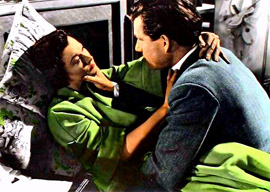
March 16, 2012

Vivien Leigh and Kenneth More in The Deep Blue Sea
Who was the first to declare that nothing counts a lot and very little counts at all? The cynic and sesquipedalian Alastair Forbes claimed it, but he spoke with a forked tongue. Iris Murdoch hinted that it was hers, but she, too, was known for bending the truth. Either way, the saying is utter crap. A hell of a lot counts, starting with the fine line between mad love and pure madness. Don’t be alarmed—I will not go into yet another reverie about Jessica/Jenny, since my friend John Sutin has pledged he will do something about it.
This last weekend was like the lost weekend of movie fame, with yet another Mick Flick extravaganza which ended late at night, followed by a Sutin oyster-and-caviar lunch on the Palace’s terrace, during which I thought I saw a Nero-like figure strumming a lyre.
They say excessive drinking can produce delusions and be harmful to one’s sex drive, but in my case it has the opposite effect. Or it could all be in my head. What is certain is that I sympathize with Terence Rattigan’s heroine in The Deep Blue Sea, a film about the ravages of erotic love in repressed 1950s Britain. When the 1955 film version came out starring Vivien Leigh and directed by Anatole Litvak, I couldn’t understand all the fuss. Hester meets young Freddie, discovers real sex, and it’s bye-bye to her faithful-but-sexless hubby. I was 19 and in the midst of adulterous relationships with two married women. I thought it normal that older women would go bananas over younger men.
Fifty-five years later, I have switched sides and now root for the oldies.
Later on in Paris I met Litvak, a sensitive director whose wife Sophie liked staying up late at Jimmy’s with young men. I wanted to know about Rattigan and the intensely repressed characters he invented. “Ses characters sont lui,” Anatole explained. This was around the time Rattigan had been shoved aside by the great unwashed playwrights of the early 1960s, something that infuriated me, especially as I had become a theater addict due to my relationship with an actress.
What continues to amaze is the cuckolded hubby. It’s true that British women back in the 1950s did not leave their husbands, but how does a man stay married to a woman who has gone ape over someone else?
I know it’s a double standard, but double standards were invented for types like me. Terence Davies, director of the latest film version of The Deep Blue Sea, says the Brits consider passion to be vulgar, but what kind of Brits? Modern Brits are fat, drunk, aggressive, loud, sloppy, and obviously très vulgar. Passion was seen as vulgar by the Brits that Rattigan wrote about, but that was half a century ago.